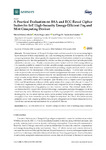A practical evaluation on RSA and ECC-based cipher suites for IoT high-security energy-efficient Fog and mist computing devices

View/
Use this link to cite
http://hdl.handle.net/2183/21449Collections
- Investigación (FIC) [1685]
Metadata
Show full item recordTitle
A practical evaluation on RSA and ECC-based cipher suites for IoT high-security energy-efficient Fog and mist computing devicesDate
2018-11-10Citation
Suárez-Albela, M.; Fraga-Lamas, P.; Fernández-Caramés, T.M. A Practical Evaluation on RSA and ECC-Based Cipher Suites for IoT High-Security Energy-Efficient Fog and Mist Computing Devices. Sensors 2018, 18, 3868.
Abstract
[Abstract] The latest Internet of Things (IoT) edge-centric architectures allow for unburdening higher layers from part of their computational and data processing requirements. In the specific case of fog computing systems, they reduce greatly the requirements of cloud-centric systems by processing in fog gateways part of the data generated by end devices, thus providing services that were previously offered by a remote cloud. Thanks to recent advances in System-on-Chip (SoC) energy efficiency, it is currently possible to create IoT end devices with enough computational power to process the data generated by their sensors and actuators while providing complex services, which in recent years derived into the development of the mist computing paradigm. To allow mist computing nodes to provide the previously mentioned benefits and guarantee the same level of security as in other architectures, end-to-end standard security mechanisms need to be implemented. In this paper, a high-security energy-efficient fog and mist computing architecture and a testbed are presented and evaluated. The testbed makes use of Transport Layer Security (TLS) 1.2 Elliptic Curve Cryptography (ECC) and Rivest-Shamir-Adleman (RSA) cipher suites (that comply with the yet to come TLS 1.3 standard requirements), which are evaluated and compared in terms of energy consumption and data throughput for a fog gateway and two mist end devices. The obtained results allow a conclusion that ECC outperforms RSA in both energy consumption and data throughput for all the tested security levels. Moreover, the importance of selecting a proper ECC curve is demonstrated, showing that, for the tested devices, some curves present worse energy consumption and data throughput than other curves that provide a higher security level. As a result, this article not only presents a novel mist computing testbed, but also provides guidelines for future researchers to find out efficient and secure implementations for advanced IoT devices.
Keywords
ECC
ECDSA
RSA
IoT
IoT security
Energy efficiency
Mist computing
Edge computing
ECDSA
RSA
IoT
IoT security
Energy efficiency
Mist computing
Edge computing
Editor version
Rights
Atribución 3.0 España
ISSN
1424-8220
1424-8239
1424-8239






